
Groundbreaking TV shows that helped society evolve
On April 8, ABC’s “Modern Family” airs its final episode. The two-part series finale — appropriately titled “Finale” — marks the 249th and 250th episodes of the series’ 11-season run. It also marks the end of an era, as “Modern Family’s” premiere in 2009 ultimately led to a change in TV and also the way the world looks at things. Becoming as popular as it was, while focused on a diverse, large, blended family, “Modern Family” highlighted different meanings of "family." You’d think that wouldn’t be such a shock on TV in 2009, but it was.
And that, of course, included the same-sex couple Mitch and Cam (portrayed by Jesse Tyler Ferguson and Eric Stonestreet, respectively) — two of the obvious MVPs of the series — and how they navigated becoming new parents. With Mitch and Cam, “Modern Family” was able to normalize LGBTQ+ characters.
In honor of “Modern Family” and the end of the run, Yardbarker has made a list of some other groundbreaking shows that helped society (not just TV) evolve.
More must-reads:
Breaking News
Trending in Entertainment
Customize Your Newsletter
 +
+
Get the latest news and rumors, customized to your favorite sports and teams. Emailed daily. Always free!

























